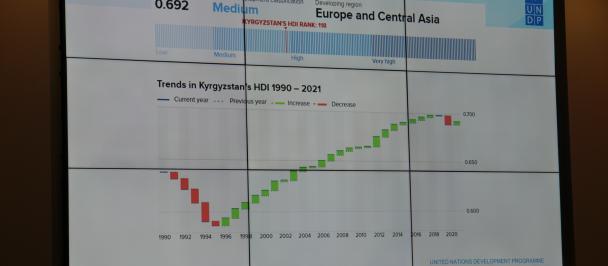National Human Development Report 2024 on energy-induced vulnerabilities
New report on human development in the Kyrgyz Republic to be released in 2024
In February 2023, the UNDP team in the Kyrgyz Republic started the preparation process for the new National Human Development Report (NHDR) that will focus on energy-driven vulnerabilities in the Kyrgyz Republic. The report will describe the connections between human development of the country citizens with such issues as energy accessibility, energy poverty, energy vulnerability and others, taking a deep dive into questions of a just energy transition that matches national strategic priorities, pledges and widely-debated international commitments.
Like any other Central Asian country, the Kyrgyz Republic has abundant renewable energy resources, considerable opportunities for energy efficiency, and an interest in increased regional energy cooperation. Yet, there are many challenges as well, stemming from obsolete infrastructure and water shortages limiting hydroelectricity generation. This leaves many Kyrgyzstani households at risk of multiple, intersecting energy vulnerabilities related to health impacts of air pollution caused by consumption of coal in residential areas; electricity shortages due to water shortages caused by climate change; low rates of gasification, metering capabilities and high rates of commercial loss in the energy sector, and others.
The NHDR is expected to identify new ways to address these challenges through an independent research process based on generation of new data on the linkages of energy and various indicators of human well-being, including non-economic ones. The NHDR preparation process will engage a variety of stakeholders including policymakers, academia, civil society, independent experts, private sector, UN agencies and development partners.
What is a National Human Development Report?
Human Development Reports are our flagship products since 1990s, when UNDP first pioneered the concept of human development as an instrument for policymakers to assess and improve human well-being through not just income and gross domestic product per capita, but also non-economic categories of indicators such as life expectancy and educational attainment. A specific composite indicator, the Human Development Index (HDI) was developed and since then has been widely used yearly to illustrate the human development situation in more than 190 countries of the world.
NHDRs represent a locally led movement for change and transform goals for poverty reduction and human development into benchmarks, plans and approaches for national action. They usually explore human development at national and sub-national levels in the context of a specific social, economic or environmental (or multidimensional) phenomenon. NHDRs make recommendations for change that generate attention and debate among stakeholders and policymakers, and raise public awareness of human development concept as such.
Previously, UNDP in the Kyrgyz Republic has prepared NHDRs on themes including general human development trends (1999), democratic governance (2000, 2001), human development in mountainous regions (2002), civil society and human development (2005), youth (2010), local self-governance (2013), and trade (2016).
NHDR work is led by two experts:
Mr. Christopher Kuonqui (USA) started his career in the UNDP Human Development Report Office, working on four Global Human Development Reports. Since, he has served in various positions with UNDP, UNAMID, ADB, AfDB, UN WOMEN, UNFPA, UN ESCAP, and CARE USA in over 30 countries. Recently, Chris led teams to develop the monitoring & evaluation frameworks to support implementation of the Revitalized-National Development Strategy for South Sudan, and to assess the UN peacekeeping mission in Darfur. In 2013-2014, he led the UNDP Afghanistan Policy Unit to be awarded an Asia-Pacific prize for innovation in measuring programmatic impact via new technologies. Across his career, Chris has served on writing and statistics for over a dozen global and national Human Development Reports, including in Afghanistan, Bhutan, Ethiopia, Maldives, Montenegro, Namibia, and Sudan. He has given talks on human development at Columbia University, New School, University of Groningen, University of Khartoum, and is an invited guest lecturer in gender and development at Emory University in Atlanta. Chris holds a master’s degree in International Affairs from Columbia University, and a bachelor’s degree in modern political thought from Vassar College.
Ms. Anna Arkhangelskaya (Kyrgyz Republic) is an experienced energy economist and researcher with 14 years of experience in national and regional power sector projects and research activities. For 9 years she also served as staff member in the Ministry of Energy, Ministry of Economy and State Committee of Energy, Industry and Subsoil Use of the Kyrgyz Republic. Anna’s core expertise is in assessing energy resources, forecasting of energy demand and supply, energy transition and energy efficiency studies, economic advisory assignments, assessment of market and administrative regulations, analysis and development of sectoral strategies and programs in the fuel and energy complex, analysing the prospects for the development of the electricity and power markets both from national and regional perspectives. Anna has been recently engaged as consultant for various energy-related projects at EBRD, World Bank, CAREC Institute, and Asian Development Bank. Throughout her career, she has written more than 20 research publications, including in peer-reviewed journals. Anna holds a PhD degree in energy economics, and a diploma in economics and management of power companies from the Kyrgyz-Russian Slavic University.
On all matters regarding the content of this NHDR and its preparation process, please contact Ekaterina Perfilyeva, NHDR coordinator at ekaterina.perfilyeva@undp.org
For media inquiries, please contact Ainagul Abdrakhmanova, Communications Officer at ainagul.abdrakhmanova@undp.org

 Locations
Locations








